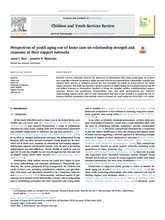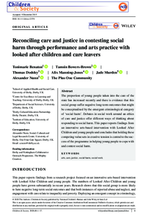Displaying 531 - 540 of 2163
The purpose of the study was to uncover challenges during the transition to adulthood for youth with disabilities who experienced foster care and elucidate the supports most beneficial in addressing these challenges.
The aim of the present study was to provide an exploratory account of foster carers’ lived experience of ending adolescent foster placements.
This is a qualitative study aimed to explore the need for preparing children ageing out of foster care for independent living in South Africa.
The present study reports on a mixed-methods evaluation of the Nurturing Attachments training, focusing particularly on its impact on carer self-efficacy and behavioural manifestations of Reactive Attachment Disorder (RAD) which are common among looked after children, even if they are not formally diagnosed.
The purpose of this study was to examine the occurrence of adverse childhood experiences (ACEs) among a convenience sample of foster parents and explore multiple relationships between foster parent-reported ACEs, resilience, and other indicators of foster parent function and well-being (parental stress, satisfaction as a foster parent, perceived challenges with fostering, intent to continue fostering).
This article describes the development of two parenting groups – Nurturing Attachments and Foundations for Attachment, devised to provide much needed support for foster, residential and kinship carers and adopters parenting children and young people of all ages. Both programmes are informed by the Dyadic Developmental Psychotherapy (DDP) model.
This study incorporated a network approach to understanding how youth discussed strong ties and defined closeness in relationships.
This paper reports findings from an innovative arts-based intervention with Looked After Children and young people and concludes that holding competing value sets in creative tension is central to the success of the programme in helping young people to cope with and contest social harm.
Using Swedish longitudinal register data on 2.167 children with experience of long-term foster care, this study explores the hypothesized mediating role of foster parents’ educational attainment on foster children’s educational outcomes, here conceptualized as having poor school performance at age 15 and only primary education at age 26.
This country care review includes the care related Concluding Observations adopted by the Committee on the Rights of the Child and the Committee on the Rights of Persons with Disabilities.



